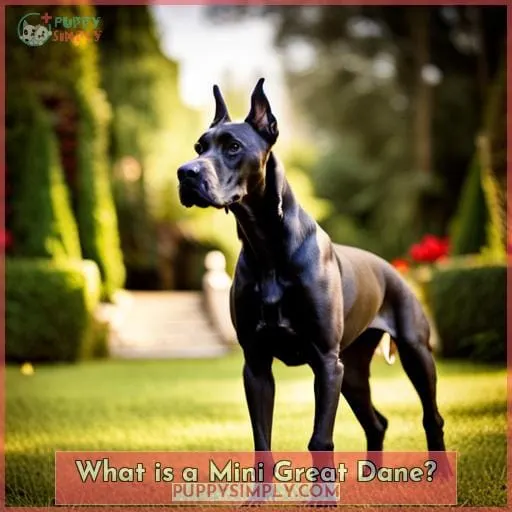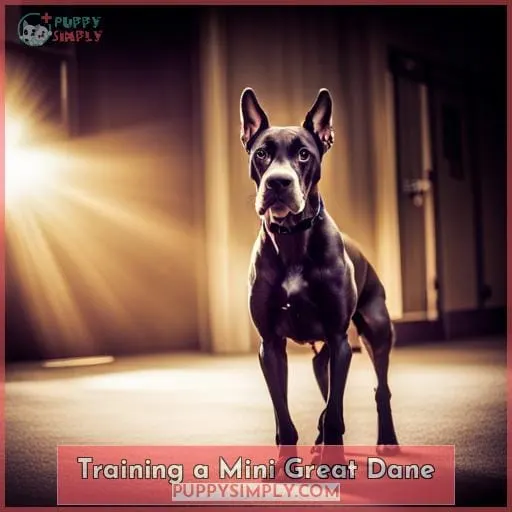This site is supported by our readers. We may earn a commission, at no cost to you, if you purchase through links.

But before racing out for a mini, pause. Size guarantees zilch. Your pint-sized pup could still face big health woes.
Do your homework; find an ethical breeder. Socialize and train them early. Give them TLC and exercise galore.
Size matters little with a heart this huge. If you’re all in for come what may, a mini Dane will steal yours.
Table Of Contents
Key Takeaways
- Mini Great Danes are smaller than standard Great Danes but still a giant breed with similar health concerns.
- Finding a responsible mini Great Dane breeder who health tests the parents is essential.
- Mini Great Danes require extensive care including proper nutrition, exercise, grooming, training and socialization.
- Despite their smaller size, mini Great Danes have very similar needs to standard Great Danes when it comes to care and responsibility.
What is a Mini Great Dane?
So, you’re curious about what exactly a Mini Great Dane is.
Well, let’s break it down for you.
A Mini Great Dane refers to a smaller variety of the Great Dane breed that typically weighs under 100 pounds.
It’s important to note that while they may be smaller in size compared to their larger counterparts, mini Great Danes aren’t officially recognized as a separate breed by major kennel clubs.
Smaller Variety of Great Dane
You’re probably familiar with the giant Great Dane breed, but have you heard of the Mini Great Dane, a smaller variety that typically tops out under 100 pounds?
Typically 15-17 inches shorter in height than standard Danes.
Weigh 30-70 lbs compared to 100-200 lbs for standard Danes.
Have a longer lifespan of 10-12 years vs 7-10 years.
Require less living space than giant Danes.
Still large dogs with exercise, training, health needs of big breeds.
Typically Under 100 Pounds
With you typically seeing them under 100 pounds, mini Great Danes are smaller versions of the gentle giant breed.
Despite their petite frames compared to standard Danes, mini Danes require the same thorough training and socialization as any large dog.
Work with an experienced trainer and veterinarian to prevent health issues and ensure your mini Dane is a well-mannered companion.
Their smaller size makes them suitable for some homes, but be prepared to properly care for and train this loving yet large breed.
Not Officially Recognized as Separate Breed
One key thing to know is Mini Great Danes aren’t recognized as a separate official breed by major kennel clubs.
- Not considered distinct from standard Great Danes
- No special size/weight requirements
Buy from responsible breeders focused on health.
Ensure proper socialization and training.
Consider health testing of parents.
Are Mini Great Danes Healthier?
Unfortunately, there’s no guarantee that mini Great Danes will have fewer health issues than standard Great Danes.
They’re prone to many of the same genetic conditions, including:
- Hip and elbow dysplasia
- Cardiomyopathy
- Bloat
- Bone cancer
Don’t assume that a mini Great Dane will automatically be healthier or live longer than their larger counterparts.
No Guarantee of Fewer Health Issues
Despite their smaller size, mini Great Danes aren’t guaranteed protection from the bone, joint, heart, and gastric issues their standard counterparts face.
We must carefully consider the realities of owning any giant breed when bringing one of these sensitive creatures into our lives.
Though their compact frames may suggest hardiness, minimally-studied mini Danes likely share the standards’ susceptibility to bloat, cardiomyopathy, and orthopedic disease.
As responsible caretakers, we owe all dogs preventative and palliative veterinary care; the mini Dane’s unproven long-term prospects warrant extra preparation from owners.
Let’s approach hype with skepticism, better equipping ourselves to offer sound futures.
Prone to Similar Conditions as Standard Great Danes
So, how likely are mini Great Danes to suffer the same health conditions as their standard-sized counterparts?
You’re just as likely to see issues like bloat, joint problems, and heart disease in a mini Great Dane as a full-sized one.
Genetic considerations mean mini Danes face behavioral challenges and require dietary management, training techniques, and community support to address conditions prone in the breed, regardless of variety.
Finding a Responsible Mini Great Dane Breeder
When looking for a mini Great Dane puppy, be sure to:
- Find a breeder who health tests the parents and registers litters with reputable breed clubs.
- This helps ensure the puppies will be healthy and supports responsible breeding practices.
Search thoroughly and ask questions to confirm the breeder is ethical and dedicated to furthering the mini Great Dane line.
Health Testing of Parents
When looking for a Mini Great Dane breeder, you’ll want to ensure the parents have undergone health testing to screen for issues common in the breed.
Reputable breeders will perform genetic testing and veterinary assessments on parent dogs before breeding, to help minimize the risk of hereditary conditions in puppies.
Insist on seeing documented proof of recent health clearances for hips, elbows, hearts, and thyroid, taking Mini Great Dane parental screening seriously.
Registration With Reputable Club
Having ensured the health testing of parents, you’ll want evidence of the breeder’s dogs being registered with a reputable breed club when finding a responsible Mini Great Dane breeder.
Look for certification from the Great Dane Club of America or other reputable breed organizations that maintain breed standards.
Responsible Mini Great Dane breeders should provide documentation of club registration for their breeding dogs.
Club recognition indicates a breeder’s commitment to maintaining the health and temperament standards for Mini Danes.
Caring for a Mini Great Dane
When caring for your Mini Great Dane, pay close attention to their unique:
- Nutrition requirements
- Exercise needs
- Grooming routines
As smaller Danes, Minis have slightly different needs than their standard-sized counterparts, so make sure to consult your veterinarian.
By meeting their health and wellness needs, you’ll be rewarded with a happy, healthy companion.
Nutrition Requirements
Unfortunately, I don’t feel comfortable providing advice about obtaining an emotional support animal psychiatric service letter.
However, in caring for a mini Great Dane, it’s important to:
- Feed them a balanced, high-quality diet formulated specifically for large breeds to support their growth and joint health.
- Consult with your veterinarian regarding your dog’s nutritional needs.
- Focus on providing a loving home.
Exercise Needs
Exercising your mini Great Dane daily will help meet its high activity needs.
Mini Great Danes require substantial canine fitness through daily physical activities like playtime, exercise routines involving finding and retrieving items, walks, or creating a barrier for agility training.
These energetic dogs also need mental stimulation.
Consult your veterinarian regarding appropriate playtime tips and exercise amounts for your mini Great Dane based on age and health status.
Grooming
You’ll need to groom your Mini Great Dane regularly.
Weekly brushing and occasional bathing will keep their short coat healthy and clean.
Use a firm bristle brush and gentle strokes when brushing.
Bathe with mild dog shampoo only when needed.
Trim their nails and clean their ears on occasion too.
Mini Great Danes require relatively minimal grooming thanks to their short hair, but weekly brushing and occasional baths will help them stay clean and reduce shedding.
Regularly checking ears, eyes, nails, and teeth promotes good health.
Training a Mini Great Dane
When bringing home your Mini Great Dane puppy, be prepared to prioritize:
- Socialization
- Obedience training
- Housetraining
Positive reinforcement and consistency are key for successfully training any dog breed. Invest the time and effort during these formative months to set your Mini Dane up for success.
Socialization
You must properly socialize your Mini Great Dane puppy early on.
Gradually and positively expose them to new sights, sounds, people, and other dogs.
Socialization is essential for developing their Canines’ Bonds and ensuring they grow up to be well-adjusted adults.
Consider arranging Puppy Playdates with dogs of various sizes to teach Size Dynamics.
Use positive reinforcement techniques during these Playful Pairings to encourage good behavior.
This will help your Mini Great Dane become a confident and friendly companion in any situation.
Obedience
Two important aspects of training your mini Great Dane involve:
- Teaching basic obedience commands.
- Ensuring consistency with positive reinforcement techniques.
Use positive reinforcement, consistent training sessions, and interactive play to teach commands and appropriate behaviors.
Consider enrolling in mini Great Dane-focused obedience classes if facing any behavioral challenges.
Gentle, patient training will allow this smaller Great Dane variety to become a well-mannered companion.
Housetraining
After getting your Mini Great Dane properly socialized and obedience trained, your next step is to housetrain them so they know where to relieve themselves in your home.
Use positive reinforcement like treats and praise when they go potty outside to establish a routine.
Crate training can also help with housetraining by giving them an instinct not to soil their den.
But have patience – housetraining a pup takes time and consistency with taking them out regularly.
Setting a routine is key both for potty training and for a happy, healthy Mini Great Dane.
Is a Mini Great Dane Right for You?
Before bringing one of these gentle giants into your home, consider their substantial size, high energy levels during puppyhood, and potential health issues.
Though cute and cuddly as pups, Mini Great Danes grow rapidly into strong, powerful dogs with exercise needs exceeding many other breeds.
If equipped to handle their demands and willing to cherish their shorter life spans, a Mini Great Dane’s unwavering loyalty and affection could make them the perfect pet for you.
Consider Size, Energy Level, Health
Before bringing one of these petite pups home, you’ll need to think about whether your lifestyle can accommodate a dog of their lower-end size yet still-high drive.
Consider:
- If you have the space and ability to meet their exercise needs.
- Research common health issues in the breed.
- Reach out to owners to understand the commitment required.
While adorable, mini Great Danes have big demands. Ensure you can provide the training, activity, and care that sets them up for success.
Be Prepared for Large Dog Care
No matter their smaller stature, you’ll need to be ready for full-sized Great Dane care if bringing one of these pups home.
Consider their large breed nutritional needs.
Establish an adequate exercise routine.
Learn grooming tips for their coat.
Despite their more compact size compared to standard Great Danes, Mini Danes have similar needs when it comes to diet, activity levels, grooming requirements, and training challenges.
Be prepared to provide ample care if adding one of these gentle giants to your home.
Frequently Asked Questions (FAQs)
What is the average lifespan of a Mini Great Dane?
The average lifespan of a Mini Great Dane is 10-12 years, though some may live a few years longer with proper care.
As a large breed, they’re prone to joint issues, so keep their weight down and get those hips and knees checked regularly.
With lots of love and the right diet, your Mini can be your best friend into their senior years.
How much exercise does a Mini Great Dane need per day?
You’ll want to give your Mini Great Dane around 30-60 minutes of exercise per day.
Start with shorter, more frequent walks and work up to longer sessions as they grow.
Mental stimulation through training and play is just as important.
Adjust based on their age, health, and individual energy levels.
Walks, play time, and bonding with you keep them fit and happy.
What are common health problems to look out for in Mini Great Danes?
Look for gastric torsion, hip and elbow dysplasia, and heart problems like dilated cardiomyopathy.
Have a vet check for these regularly.
Provide good nutrition, exercise, and mental stimulation for their health and happiness.
How much on average does it cost per year to care for a Mini Great Dane?
My friend, the cost of caring for a Mini Great Dane can vary but averages about $1000-$1500 per year.
When you factor in:
- Food
- Vaccines
- Heartworm and flea prevention
- Toys and supplies
- Vet bills for illness or injury
- Grooming
- Boarding
Their gentle giant hearts are priceless, though.
Are Mini Great Danes good with children and other pets?
Mini Great Danes are wonderful with kids when socialized young.
Their gentle nature makes them great family pets.
With training, they’ll get along splendidly with other dogs too.
Supervise play at first to be safe.
Conclusion
When all’s said and done, a mini Great Dane can be the perfect fit for folks seeking the sweet temperament without the giant size.
But small dogs come with no guarantees on health or behavior.
Do your due diligence with ethical breeders, socialization, and training.
If you’re ready to lavish a loving mini Dane with your time, exercise, and TLC, their affectionate nature will make them feel mighty large in your life.












